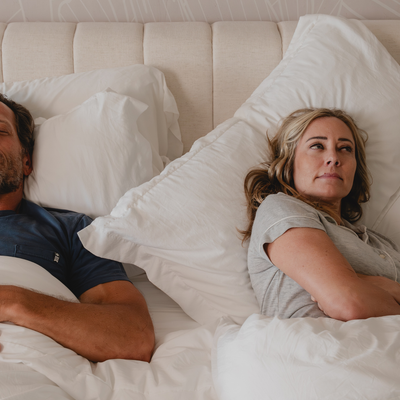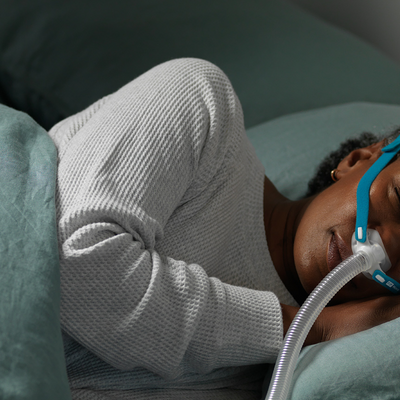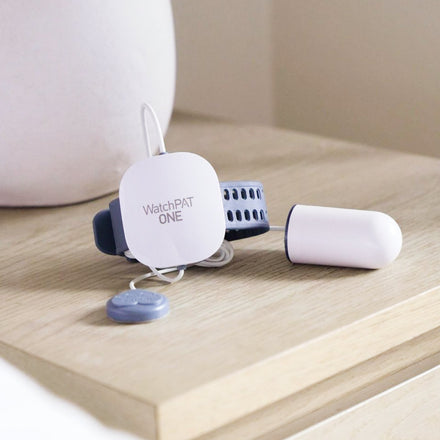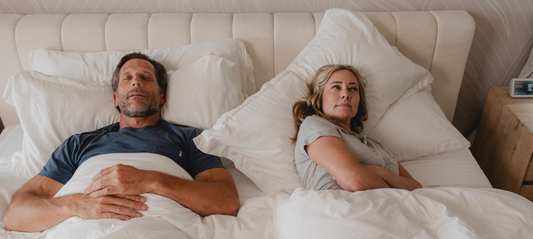Your partner accuses you of loud snoring. You feel so tired during the day, you sometimes fall asleep at work. You can’t concentrate on tasks, and your upbeat mood quickly dissolves into irritability.
In short, you just don’t feel like … you. Could sleep apnea be the culprit of your symptoms?
The symptoms of sleep apnea vary by person. They depend on your age, weight, gender, pre-existing health conditions, and lifestyle. Still, there are common signs that indicate OSA for you or your bed partner.
Obstructive Sleep Apnea Symptoms
Obstructive Sleep Apnea (OSA) is the most common form of sleep apnea. It’s caused by relaxed throat muscles that narrow or block your airway, leading to poor-quality sleep, daytime fatigue, and other debilitating symptoms.
Tell-tale symptoms of OSA include one or more of the following:
- Loud, chronic snoring
- Daytime sleepiness
- Gasping or choking while asleep
During sleep, a person with OSA will experience pauses in breathing (called apneas) at least five times per hour. These apneas cause the person to wake up or gasp or choke for air. A person with OSA may not remember waking up during the night, but a bed partner might notice their restless sleep, disrupted breathing, or loud snoring.
If you sleep alone, or if your bed partner doesn’t notice your sleep patterns, consider other symptoms that indicate the effects of poor sleep.
Additional nighttime OSA symptoms include…
- Insomnia
- Waking up multiple times during night
- Restless sleep
- Night sweats
- Decreased sex drive
- Frequent urges to urinate during the night
Meanwhile, daytime symptoms of sleep apnea include …
- Sore or dry throat or mouth after waking up
- Dizziness after waking up
- Morning headaches
- Irritability or mood swings
- Depression or anxiety
- Fatigue
- Forgetfulness or difficulty concentrating
- Sleepiness while doing activities, such as working, watching TV, reading, or driving
Central Sleep Apnea Symptoms
Central Sleep Apnea (CSA) is a less common form of sleep apnea. While it does impair your body’s normal breathing process, CSA’s cause for disrupted breathing is dysfunction of the central nervous system, not a blocked or narrowed airway.
CSA shares symptoms with OSA, such as poor sleep, morning headaches, daytime fatigue, and difficulty concentrating. People with CSA might also wake abruptly or have difficulty staying asleep.
While many OSA and CSA symptoms overlap, they have distinct causes. Therefore, it’s important to take note of your symptoms and consult a doctor who can connect the cause to CSA or, more commonly, to OSA.
Sleep Apnea Symptoms in Women
Risk for OSA increases with weight and age, particularly for women who are post-menopausal or have a higher BMI. Women may also be at increased sleep apnea risk during pregnancy.
While OSA is diagnosed more often in men, it’s more likely to go undetected in women. And the reasons for OSA under-diagnosis among women have a lot to do with symptoms.
First, women experience a greater variety of symptoms than men. While men commonly report sleepiness, women more often report headache, fatigue, insomnia, sleep deprivation, depression, and anxiety. Women may experience greater sleep deprivation because they are more likely than men to wake up from breathing disruptions during sleep.
Second, women typically have less severe sleep apnea than men: they tend to have fewer pauses in breathing (apneas) during the night, and the pauses tend to be shorter. Plus, their symptoms tend to be more subtle.
Third, sleepiness and snoring are seen as primary symptoms of OSA. If women experience less typical symptoms — insomnia, headache, anxiety, and depression — instead of sleepiness or snoring, they (or their doctors) may not acknowledge the possibility of OSA as a cause. Instead, their symptoms may be explained by other medical conditions, or they could be overlooked entirely!
How to Treat Your Symptoms of Sleep Apnea
Nighttime breathing patterns are a strong indicator of sleep apnea. But because OSA hinders a person’s ability to get high-quality, restorative sleep, they’ll likely experience the daytime consequences of poor sleep.
Are you tired, sleepy, or irritable — even after a full night’s sleep? Do you or your bed partner recognize at least one of the night or daytime symptoms described in this post? Take a home sleep test to determine if you have OSA.
First, you’ll schedule an online consultation with a physician who will evaluate your sleep health. Then you’ll use a small, portable device that tracks your breathing patterns during one night of sleep. Finally, the physician will assess your results to give you a diagnosis and treatment plan.
With the right treatment, your symptoms will ease — or even disappear! Imagine reaping the rewards of a full night’s sleep and a day full of energy, focus, and clarity.

















